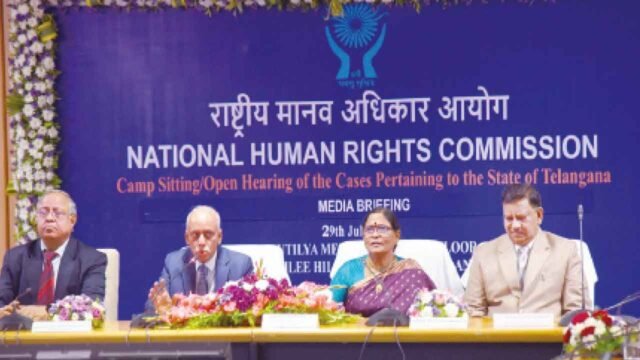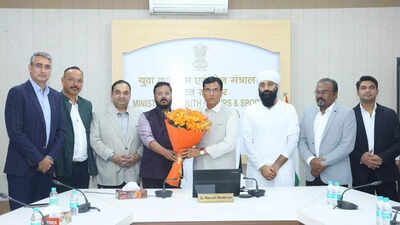Hyderabad: The National Human Rights Commission (NHRC) of India concluded a two-day Camp Sitting and Full Commission Hearing in Hyderabad, addressing a total of 109 human rights violation cases across Telangana. The sessions marked a significant step toward institutional reform, sensitization of state functionaries, and collaborative justice delivery.
Present during the proceedings were senior government officials, including the Chief Secretary, Director General of Police, and department heads. Deliberations centered on issues impacting women, children, and marginalized communities, as well as the strengthening of enforcement mechanisms and accountability in state governance.
Of the 109 cases, 90 were heard in the open session. Key grievances included fire-related child deaths in hospitals, attacks by wild animals, stray dog threats, trafficking of tribal women, police excesses, denial of pensions, and lack of basic infrastructure. Notably, misappropriation under the Dalit Bandhu scheme and administrative lapses in Gurukul schools were highlighted as areas of systemic concern.
The Commission’s main directives during the two-day hearings include: Caste-Based Boycott (Khammam): Immediate end to discriminatory practices enforced after the NHRC’s directive.
Gurukul School’s negligence has prompted the Secretaries to order a comprehensive report within four weeks regarding 48 deaths and 886 food poisoning incidents. The commission took cognizance of Police Misconduct, and the Telangana government was mandated to provide detailed documentation on wrongful arrest and the alleged lathi charge case.
About the industrial explosion at the DRDO-linked unit, it has been ordered that Rs 50 lakh in compensation be paid to the families of the victims. Regarding the issue of stray dogs, authorities have been instructed to develop a standard operating procedure (SOP).
Additionally, punitive action was taken against involvement in trafficking, leading to the dismissal of a constable found guilty of trafficking tribal women, who have since been rescued.
Parallel to the hearings, NHRC Chairperson Justice V. Ramasubramanian chaired a strategic session with state leadership, emphasizing timely compliance, systemic preventive measures, and multi-sectoral coordination. Chairperson Bharat Lal emphasized concerns regarding climate change, environmental balance, and businesses’ human rights responsibilities.
The issues discussed at the Full Commission Hearing include: crimes against women and children, child malnutrition and educational gaps, man-animal conflict fatalities, operational failures in the SC Corporation, grievances from farmers and fish seed producers, and the protection of LGBTQI rights.
During the Full Commission session, 19 cases were examined, and a total compensation of Rs 49.65 lakh was recommended, of which Rs 22.50 lakh has already been disbursed. Additionally, 31 cases were closed, with 29 closed on merit and 2 closed after compliance verification.
The NHRC also engaged with NGOs, civil society actors, and human rights defenders to forge pathways for joint monitoring and redressal. The Secretary General of the National Human Rights Commission (NHRC) emphasized the importance of collaborating with the State Human Rights Commission and encouraged citizens to submit grievances digitally through hrcnet.nic.in.
During interactions with stakeholders, several concerns were raised, including: Support for elderly and disabled citizens; Assistance for bedridden patients; and Delays in documentation and access to social schemes for children.
Justice Ramasubramanian praised the contributions of civil society and reaffirmed the NHRC’s commitment to uphold constitutional rights through fearless and impartial intervention.






